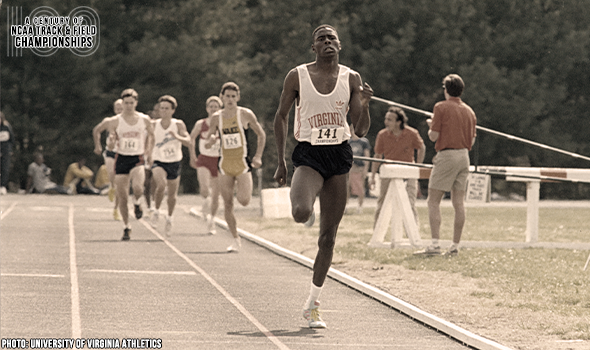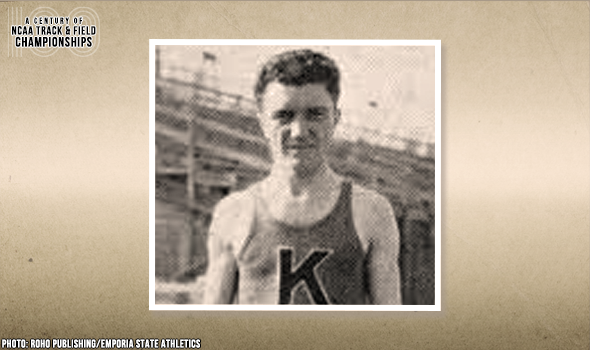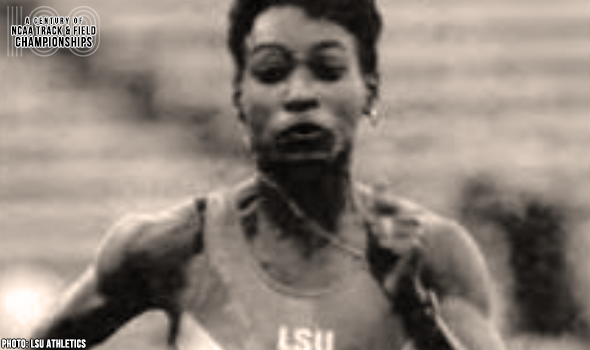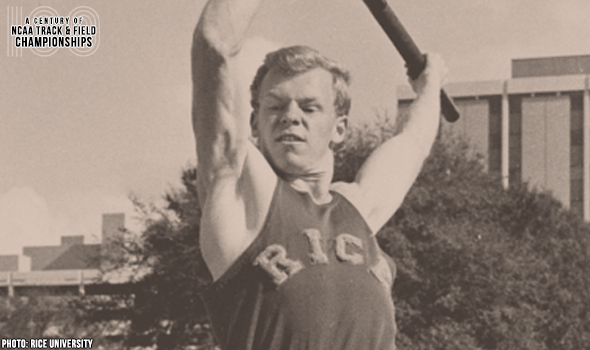
Can Ereng Kick It? Yes, He Can!
Paul Ereng of Virginia had one of the best kicks and everyone knew it.
The best strategy to beat him in the 800, it was thought, was to try to take the sting out with a fast pace, and that’s what Florida’s Mark Everett attempted at the 1988 NCAA Division I Outdoor Track & Field Championships at Hayward Field in Eugene, Oregon.
Everett, a 1:46.46 sophomore who also anchored the Gators’ 4×400 relay team, went out to a huge lead in the first 200 then cruised through the halfway point in 51.8.
It wasn’t fast enough. The freshman Ereng coasted in last place, waiting until just before the 600-meter point to unleash his vaunted finishing kick. By the homestretch, Ereng was battling Everett with Texas Southern’s Maude Ado trying to keep up. As Everett faded Ereng won in a near-PR 1:46.76 with remarkably even 400-meter splits of 53.5 and 53.3.
“I was tentative at the beginning,” explained Ereng. “I knew they were running hard. I knew I was going to run well at the end.”
Before Ereng won a second NCAA DI Outdoor title in 1989, the rest of the world saw just how a great a runner he was. In the summer of ’88 he won Olympic gold at Seoul in 1:43.45, beating 1984 gold medalist Joaquim Cruz, the former Oregon star who held the fastest “all-dates” collegiate best at 1:41.77.
Then in 1989, Ereng won the World Indoor Championships in a world record of 1:44.84 that remains the indoor collegiate record. A week later, he won the NCAA Indoor title in 1:47.69, then second-fastest in meet history.
The NCAA and collegiate track & field will mark a momentous milestone in the spring of 2021 -- the 100th anniversary of the NCAA Championships and with that, the NCAA Track & Field Championships. In June 1921, the University of Chicago hosted the first track & field championships in NCAA history.
This point can’t be emphasized enough: Not only was the event the first for NCAA track & field, but the first championships for any sport under the sponsorship of the NCAA.
To celebrate, over each of the next 365 days, the U.S. Track & Field and Cross Country Coaches Association (USTFCCCA) will celebrate moments, student-athletes, and coaches that have made a century’s worth of championships special. From humble beginnings to important historical milestones to the modern-day, collegiate track & field has evolved with the American society.
The 2021 edition of the NCAA Division I Outdoor Track & Field Championships begin with preliminary round action on May 27-29 in Jacksonville, Fla., and College Station, Texas. The championships final site and culmination of the celebration is slated for June 9-12, 2021 at the newly rebuilt Hayward Field in Eugene, Ore.

Clemson’s Ross Kept Getting Faster In 1995
Duane Ross PR’d twice in the 110H at the 1995 NCAA DI Outdoor T&F Championships. When Ross won in 13.32, he became the No. 3 performer in collegiate history.

Illinois’ Kerr Went Back-To-Back At NCAAs
George Kerr won back-to-back 800/880 titles at the NCAA Outdoor T&F Championships in 1959 & 1960. Kerr set a meet record of 1:46.4 in the 800 meters in 1960.

UCLA’s Baucham Bounded To TJ CR In 2005
Candice Baucham won the triple jump at the 2005 NCAA DI Outdoor T&F Championships with a collegiate record of 14.07m (46-2). Baucham took the event by more than one foot.

San Romani Went From Unknown To Legend
Archie San Romani won back-to-back 1500/mile crowns at the NCAA Outdoor T&F Championships in 1935 & 1936.

Auburn’s Glance Made Them Look Twice
Harvey Glance completed the 100-200 double as a freshman at the 1976 NCAA DI Outdoor T&F Championships. He set a meet record of 10.16 in the 100.

Nova’s Rhines Did NCAA 5K Three-Peat
Jen Rhines was the first female athlete in the history of the NCAA DI Outdoor T&F Championships to win three consecutive 5K titles.

Georgia’s Erm Cruised To 2019 Decathlon Title
Johannes Erm won the decathlon at the 2019 NCAA DI Outdoor T&F Championships by 342 points with his 8352 total. That was also the fifth-best score in meet history.

McMillen Adapted, Set 1500 MR In 1952
Bob McMillen set a meet record in the 1500 meters of 3:50.7 at the 1952 NCAA Outdoor Track & Field Championships.

LSU’s Duhaney Destroyed NCAA 200 Field In 1992
Dahlia Duhaney owns the largest margin of victory in meet history in the 200 with her 0.44-second winner at the 1992 NCAA DI Outdoor T&F Championships.

Rice’s Roberts Cooked Up Pole Vault Greatness
Dave Roberts was the second man to win three consecutive pole vault titles at the NCAA DI Outdoor T&F Championships, doing so from 1971 to 1973.

